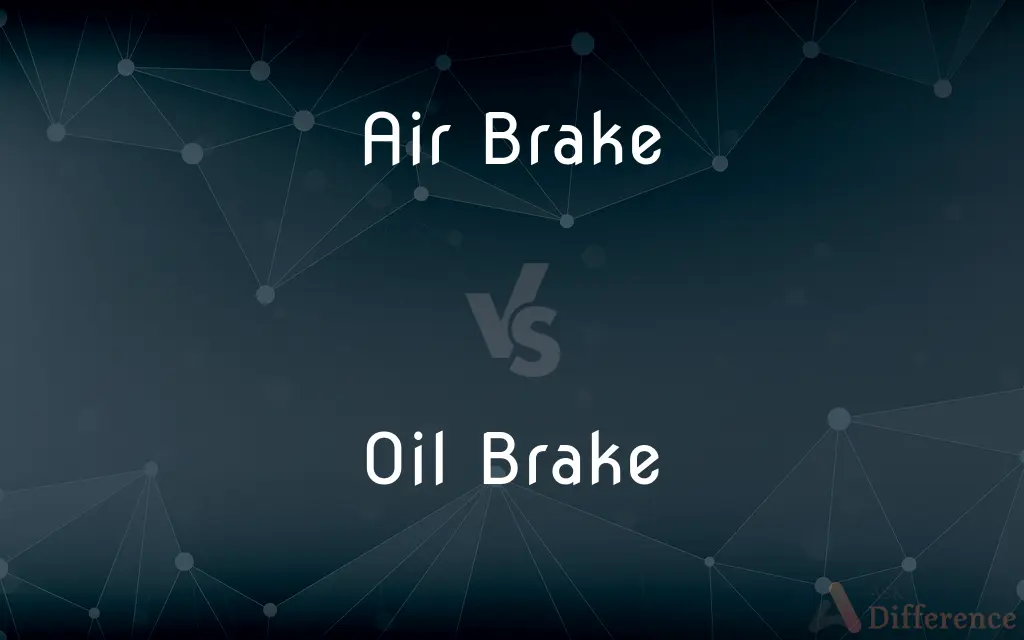Air Brake vs. Oil Brake — What's the Difference?
By Maham Liaqat & Urooj Arif — Published on March 7, 2024
Air Brakes use compressed air to create the force needed to apply brakes, common in heavy vehicles, while Oil Brakes, or hydraulic brakes, use brake fluid to transmit pressure, found in most passenger cars for smooth and efficient braking.

Difference Between Air Brake and Oil Brake
Table of Contents
ADVERTISEMENT
Key Differences
Air Brakes and Oil Brakes (hydraulic brakes) are two distinct systems designed for slowing down or stopping vehicles by converting kinetic energy into heat energy through friction. Air Brakes operate on compressed air to exert force on the brake pad or drum, thus slowing down the vehicle. This system is predominantly used in buses, trucks, and other heavy vehicles due to its reliability and effectiveness in managing the high inertia of such vehicles over long distances and frequent use.
Oil Brakes, more commonly known as hydraulic brakes, utilize a brake fluid-filled system to transfer the force from the brake pedal to the brake pads or shoes. The system multiplies this force, applying the necessary pressure to the braking mechanism. Hydraulic brakes are preferred in passenger cars and motorcycles for their precise control, responsiveness, and ease of maintenance.
One of the key differences between the two systems is their operational fluid. Air Brakes use air, which is abundant and can be compressed and stored in tanks on the vehicle. In contrast, Oil Brakes rely on a specially formulated brake fluid that operates within a closed system. The choice of fluid impacts the system's maintenance and performance. Air systems require regular draining of moisture and checks for leaks, while hydraulic systems need periodic flushing and replacement of the brake fluid to prevent contamination and ensure optimal performance.
Another distinction is in their failure modes. Air Brake systems, if leaking, tend to fail to a 'safe' state; that is, if air pressure drops below a certain level, the brakes automatically apply, stopping the vehicle. Hydraulic brake systems, on the other hand, can lose braking power if there's a leak in the system since the fluid is essential for transmitting the braking force. Regular inspections and maintenance are crucial to prevent such failures.
The complexity and cost of the systems also differ. Air Brake systems are more complex and expensive to install and maintain, justified by their use in heavy vehicles where safety and performance are critical. Hydraulic brakes are simpler and more cost-effective, making them suitable for passenger vehicles where these conditions are more easily managed.
ADVERTISEMENT
Comparison Chart
Principle
Uses compressed air to apply force to brakes
Uses brake fluid to transmit pressure to the braking system
Main Use
Heavy vehicles like trucks and buses
Passenger cars and motorcycles
Fluid Used
Air
Brake fluid
Maintenance
Requires moisture removal and leak checks
Needs periodic fluid replacement and leak checks
Failure Mode
Fails safe (brakes apply if pressure is lost)
Loss of fluid can lead to brake failure
System Complexity
More complex, with air tanks and compressors
Simpler, with a master cylinder and brake lines
Responsiveness
Can be less immediate due to air compression time
Highly responsive due to direct fluid pressure application
Cost
Higher installation and maintenance costs
Lower cost, simpler maintenance
Safety Feature
Automatic application in case of system failure
Requires manual pumping if power assistance fails
Compare with Definitions
Air Brake
Air Brakes use compressed air to activate braking mechanism.
Modern trucks utilize air brakes for efficient stopping power.
Oil Brake
Fluid needs regular replacement to maintain performance.
Flushing the brake fluid improves brake response.
Air Brake
Requires air compressors and storage tanks on vehicles.
Air brake systems include tanks that store compressed air.
Oil Brake
They offer precise control and responsiveness.
Hydraulic brakes provide immediate feedback to drivers.
Air Brake
They are essential for heavy-duty vehicles for safe braking.
Buses rely on air brakes for the safety of passengers.
Oil Brake
Loss of fluid can lead to braking failure.
A leak in the brake line can reduce the braking efficiency.
Air Brake
Air Brakes automatically apply if air pressure drops.
Emergency brakes activate if the air brake system leaks.
Oil Brake
Hydraulic Brakes use brake fluid to transmit pedal force.
Most cars have hydraulic brakes for smooth stopping.
Air Brake
Maintenance involves checking for air leaks and moisture.
Regular draining of water from the air tanks is necessary.
Oil Brake
System includes a master cylinder and brake lines.
Pressing the brake pedal pushes fluid through the lines.
Common Curiosities
Which is more reliable, air brakes or hydraulic brakes?
Reliability depends on the application; air brakes are more reliable for heavy vehicles due to their fail-safe mechanism, while hydraulic brakes are reliable for light vehicles with their precise control.
Can oil brakes be used on heavy trucks?
While possible, hydraulic brakes are less common on heavy trucks due to the high pressure required for stopping such large vehicles, making air brakes a more practical choice.
Are hydraulic brakes more expensive to maintain than air brakes?
Maintenance costs can vary, but hydraulic brake systems generally require less intensive maintenance than air brakes, which need regular air system checks and moisture control.
Can air brakes freeze in cold weather?
Yes, moisture in the air brake system can freeze in cold temperatures, potentially affecting the brakes' effectiveness, which is why moisture must be regularly drained from the system.
Why do air brakes make a hissing noise?
The hissing noise is the sound of compressed air being released when the brake pedal is pressed, which is a normal part of the air brake system's operation.
Can I upgrade my vehicle from hydraulic to air brakes?
Upgrading a vehicle from hydraulic to air brakes would be impractical and costly due to the different mechanisms and purposes of the two systems.
What happens if there's a leak in an air brake system?
If an air brake system leaks, it can trigger the brakes to apply, stopping the vehicle to prevent a loss of control.
How often should hydraulic brake fluid be changed?
It's recommended to change hydraulic brake fluid every 2 years or as specified by the vehicle manufacturer to ensure optimal performance.
What's the main advantage of air brakes over hydraulic brakes?
The main advantage of air brakes is their robustness and safety in heavy-duty applications, with an automatic fail-safe mechanism.
Is one type of brake safer than the other?
Both systems have safety features suitable for their applications; air brakes have a fail-safe for heavy vehicles, while hydraulic brakes offer precise control for everyday driving.
How do environmental conditions affect hydraulic brakes?
Hydraulic brakes can be affected by fluid degradation due to moisture absorption and temperature changes, requiring regular maintenance.
What causes air brakes to fail?
Air brake failure can result from leaks, moisture freezing in the system, or compressor failure, among other issues.
Why are hydraulic brakes preferred for passenger cars?
Hydraulic brakes provide smoother and more precise control, which enhances the driving experience in passenger cars.
Can the brake fluid for hydraulic brakes be any type of oil?
No, hydraulic brakes require specific types of brake fluid, as specified by the vehicle manufacturer, to ensure proper operation and avoid damage.
Are air brakes more environmentally sensitive than hydraulic brakes?
Yes, air brakes are more sensitive to environmental conditions like moisture and temperature, which can affect their operation and maintenance needs.
Share Your Discovery

Previous Comparison
Metamucil vs. Psyllium
Next Comparison
Polyglot vs. PolymathAuthor Spotlight
Written by
Maham LiaqatCo-written by
Urooj ArifUrooj is a skilled content writer at Ask Difference, known for her exceptional ability to simplify complex topics into engaging and informative content. With a passion for research and a flair for clear, concise writing, she consistently delivers articles that resonate with our diverse audience.













































